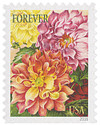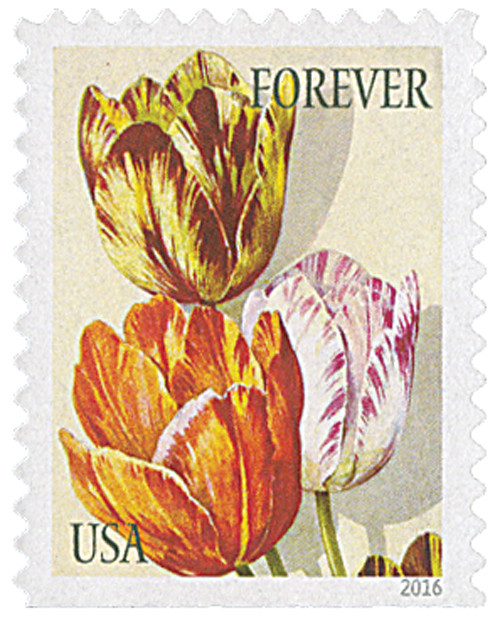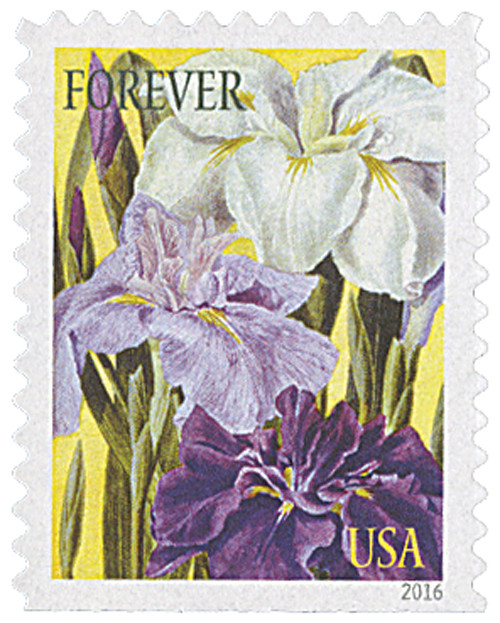
# 5045 - 2016 First-Class Forever Stamp - Botanical Art: Dahlias
US #5045
2016 Dahlias – Botanical Art
- Celebrates botanical artwork in American nursery catalogs printed between 1891 and 1912
Stamp Category: Definitive
Set: Botanical Art
Value: 49¢ First Class Mail Rate (Forever)
First Day of Issue: January 29, 2016
First Day City: Atlanta, Georgia
Quantity Issued: 60,000,000
Printed by: Ashton Potter
Printing Method: Offset
Format: Booklets of 10 OR Double-sided booklets of 20
Tagging: Nonphosphored type III, block tag applied
Why the stamp was issued: To continue the tradition of printing floral-themed US stamps.
About the stamp design: Pictures dahlias from an American nursery catalog printed between 1891 and 1912. The catalog was from The New York Botanical Garden’s Nursery and Seed Catalog Collection.
First Day City: The First Day of Issue Ceremony was held at the American Philatelic Society’s AmeriStamp/Southeastern Stamp Expo. at the Hilton Atlanta in Atlanta, Georgia.
About the Botanical Art set: 10 stamps all picturing different artwork from a 100+ year old American nursery catalog. Species pictured include: corn lilies, tulips, dahlias, stocks, roses, Japanese irises, petunias, and jonquils.
History the stamp represents: Mail order seed companies produce and sell flowers, fruits, and vegetables. To meet their customer’s needs, many also sell bulbs and young plants. Today, seed production is a multi-billion dollar business that utilizes facilities around the world.
Many companies offer a variety of seeds that have been purchased from suppliers and packaged under their brand name. Smaller companies may specialize in only a handful of varieties.
Hybrids are routinely created, providing varieties that are disease resistant, result in higher yields, or are more visually appealing. Many gardeners, however, prefer to plant “heirloom” seeds. These seeds, which are harvested from older plants, may be organic or open-pollinated. As concerns grow over genetically engineered crops, many modern gardeners avoid hybrids in favor of heirloom seeds.
While some large seed companies offer their product in retail stores, most depend on catalog sales. Gardeners have grown accustomed to seed catalogs arriving during the long winter months. From lavishly decorated covers to exciting new varieties, these catalogs help lift the gloom of winter with the hope of a bountiful spring garden.
US #5045
2016 Dahlias – Botanical Art
- Celebrates botanical artwork in American nursery catalogs printed between 1891 and 1912
Stamp Category: Definitive
Set: Botanical Art
Value: 49¢ First Class Mail Rate (Forever)
First Day of Issue: January 29, 2016
First Day City: Atlanta, Georgia
Quantity Issued: 60,000,000
Printed by: Ashton Potter
Printing Method: Offset
Format: Booklets of 10 OR Double-sided booklets of 20
Tagging: Nonphosphored type III, block tag applied
Why the stamp was issued: To continue the tradition of printing floral-themed US stamps.
About the stamp design: Pictures dahlias from an American nursery catalog printed between 1891 and 1912. The catalog was from The New York Botanical Garden’s Nursery and Seed Catalog Collection.
First Day City: The First Day of Issue Ceremony was held at the American Philatelic Society’s AmeriStamp/Southeastern Stamp Expo. at the Hilton Atlanta in Atlanta, Georgia.
About the Botanical Art set: 10 stamps all picturing different artwork from a 100+ year old American nursery catalog. Species pictured include: corn lilies, tulips, dahlias, stocks, roses, Japanese irises, petunias, and jonquils.
History the stamp represents: Mail order seed companies produce and sell flowers, fruits, and vegetables. To meet their customer’s needs, many also sell bulbs and young plants. Today, seed production is a multi-billion dollar business that utilizes facilities around the world.
Many companies offer a variety of seeds that have been purchased from suppliers and packaged under their brand name. Smaller companies may specialize in only a handful of varieties.
Hybrids are routinely created, providing varieties that are disease resistant, result in higher yields, or are more visually appealing. Many gardeners, however, prefer to plant “heirloom” seeds. These seeds, which are harvested from older plants, may be organic or open-pollinated. As concerns grow over genetically engineered crops, many modern gardeners avoid hybrids in favor of heirloom seeds.
While some large seed companies offer their product in retail stores, most depend on catalog sales. Gardeners have grown accustomed to seed catalogs arriving during the long winter months. From lavishly decorated covers to exciting new varieties, these catalogs help lift the gloom of winter with the hope of a bountiful spring garden.














